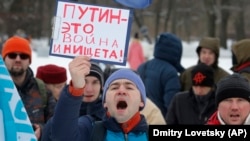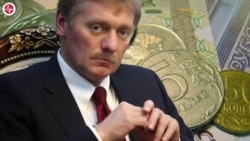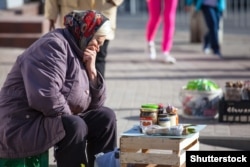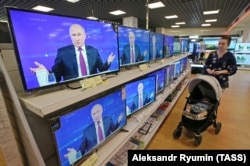Speaking with Russian-state television Channel One TV host Vladimir Posner on June 17, Alexey Kudrin, chairman of the Audit Chamber, Russia’s parliamentary-controlled budgetary watchdog, said poverty has become Russia’s “shame” and warned the growing number of people living below the poverty line could cause a “social explosion.”
Kudrin said that majority of poor in Russia – 70% – are families with children, adding that the Russian budget is “capable of instantly reducing the number of such families by 40%” if the government was to take immediate actions.
The Kremlin called Kudrin’s warning “emotional” and denied there has been an alarming rise in poverty levels.
President Vladimir Putin’s press secretary, Dmitry Peskov, said on June 18 that the number of Russians living in poverty has “slightly increased” due to “external economic conditions” but insisted that “one cannot talk about the growth of poverty.”
Peskov’s claim is false.
Russia’s state statistical agency Rosstat reported that the percentage of the population living below the poverty line in 2018 was 12.9%, which was 0.4% lower than in 2017, when it was 13.2%, but very close to the level in 2011, when it was 12.7%. In terms of actual numbers, Rosstat reported that 18.9 million people were living below the poverty line in 2018, down from around 19.5 million in 2015-2017 but 3.5 million more than in 2012, when the fewest number of Russians were living in poverty -- 15.4 million.
Other Russian state agencies and research institutions have disputed the Rosstat reports.
Yelena Grishina, the head of the laboratory of social analyses at the Russian Institute of Social Analyses and Prognosis (ISAP), a branch of the Presidential Academy of National Economy and Government Services, said the actual number of people living below the poverty line is around 36 million or 24.8-25.2% of the total population. That is nearly twice the official statistics.
ISAP, which monitors the socio-economic situation in the country and publishes monthly reports, says its reports are based on comparative data from three Russian federal agencies – Rosstat, the Treasury and the Central Bank.
In its most recent report, dated May 2019, the ISAP examined how a change in Rosstat’s methodology for determining poverty statistics had affected its findings.
“As a result of the transition of Rosstat to a new methodology for calculating income, the structure of monetary income of the population has changed significantly,” ISAP reported, adding that the new methodology had yielded a smaller ratio between rich and poor and lower poverty statistics.
While Rosstat reported that Russian incomes increased 0.2% during the first three months of 2019 compared to same period of 2018, according to ISAP, the “actual monetary incomes of population have decreased by 2.3%.”
ISAP also found that in the first three months of 2019, the proportion of “subjectively poor people” in Russia, who assess their financial situation as “bad” or “very bad” rose to 29.6% from 25.3% in 2018.
As for Peskov’s reference to the “external economic conditions” being the main reason for growing poverty in Russia, Alexey Kudrin has repeatedly rejected that argument.
While Kudrin said in a recent interview that international sanctions are indeed “tearing off” 0.5% from Russia’s GDP growth rate, he told the All-Russia Civil Forum in November 2017 that the poor quality of public administration in Russia was the main reason the government could not overcome problems like poverty.
“In its current state, it cannot solve the problems we are talking about,” Kudrin said.
President Vladimir Putin, speaking on June 20 during Direct Line, his annual nationally televised call-in television program, said Kudrin, known as a free economist, was “drifting” toward the views of fellow economist Sergei Glazyev, who is an adviser to Putin on regional economic integration and is known for holding statist economic views.









